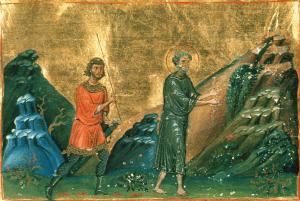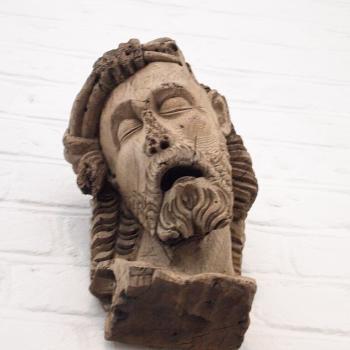
The martyr, St. Philumenos, was a bread merchant by occupation, and a Christian by faith. He might have sold bread, but received his sustenance from the bread of life.[1] Despite his simple occupation, he made enemies, and they reported to the authorities that he was a Christian. This was during the reign of the emperor Aurelian, when one could be executed for being a Christian.[2] Philumenos, taken before a judge, was, like many martyrs before him, given the chance to renounce the faith; when he did not, the judge had nails put into his head, hands, and feet, and once they were in his body, he was made to walk, and as he walked, he bled until he died.
It is likely we will not find ourselves in a situation like Philumenos; it is unlikely that we will be called to a judge and find ourselves condemned to death for our Christian faith. Those who suggest Christians are suffering a wave of persecution in the United States, or in other Western nations, do a disservice to the martyrs, to those who truly experienced persecution.[3] But we are like Philumenos in that we are to seek after Christ, to allow ourselves to follow after him wherever it shall take us; we might have material success one day, but the next find ourselves suffering misfortune. It is what we do in such a time which reveals our true character. What do we truly seek after in this world? Material gain? If we are not careful, we will end up pursuing money and riches and make it our true goal in life, and once we do so, we will ignore various moral obligations which are expected of us as we will find they get in the way of our own monetary gain. Then, we will find ourselves forsaking Christ for Mammon. Once we ignore the dictates of justice, as we take what we can from others, we renounce Christ and establish Mammon as our god. We should not pursue riches, storing it up for ourselves alone; for when we do so, we disrupt the just distribution of good, creating injustice in our wake, for we store up the riches which others need in order to survive.
We should realize that no matter how much wealth we store up, how much we use it to enjoy worldly pleasures at the expense of others, we will one day be gone from this world. We do not know when it will be. We should not be storing it up if, in doing so, we let others suffer, because then we will find ourselves storing up God’s wrath alongside them. We should rather store up God’s grace, embrace his justice, and engage works of charity when we can, ignoring the call of Mammon, as Jesus himself indicated with a parable:
And he told them a parable, saying, “The land of a rich man brought forth plentifully; and he thought to himself, `What shall I do, for I have nowhere to store my crops?’ And he said, `I will do this: I will pull down my barns, and build larger ones; and there I will store all my grain and my goods. And I will say to my soul, Soul, you have ample goods laid up for many years; take your ease, eat, drink, be merry.’ But God said to him, `Fool! This night your soul is required of you; and the things you have prepared, whose will they be?’ So is he who lays up treasure for himself, and is not rich toward God” (Lk. 12:16-21 RSV).
Every moment we live might be the last moment of our temporal existence. We might not be persecuted for our faith, we might not be tempted to renounce Christ by physical torture, but we constantly find ourselves challenged to follow Christ and his commands. How many of us live as if they mean nothing? If we like to think of ourselves as faithful Christians who would remain true to Christ if we are threatened with martyrdom, why then do we not show such fidelity when we are tempted with unjust prosperity? If we can’t suffer a lack of material goods, how can we truly say we would suffer for Christ, because it is clear, we are already not willing to do so?
“Take no part in the unfruitful works of darkness, but instead expose them. For it is a shame even to speak of the things that they do in secret; but when anything is exposed by the light it becomes visible, for anything that becomes visible is light” (Eph. 5:11-13 RSV). We must realize that the greatest temptation we have to renounce the faith comes from within. We are constantly being tempted to ignore the dictates of Christ, to renounce Christ by not doing what he told us to do. We find various reasons to excuse ourselves, just as many of the lapsed found reasons to excuse their own actions. But it will all be exposed in the light of Christ’s judgment. We should not presume ourselves faithful when we undermine his teachings; there is no need for external persecution when we renounce the faith without it. If we put more faith in Mammon than in Christ, if we act like the rich man trying to horde our wealth, accumulating more wealth than we could ever use for ourselves in our lifetime, we have abandoned Christ for Mammon, and we only have ourselves to blame. “Look carefully then how you walk, not as unwise men but as wise, making the most of the time, because the days are evil. Therefore do not be foolish, but understand what the will of the Lord is” (Eph. 5:15-17 RSV).
We must pursue Christ not riches. We must seek to enclose Christ in our hearts, not riches in our walls. Saints, as St. Cyril of Alexandria explained, know this, which is why he said: “For it is not the habit of the saints to rejoice over worldly riches.”[4] For they know such riches are ephemeral and do not last, and those who have them justly suffer many temptations. Certainly it is not riches themselves, but the love of money, avarice, which leads us astray; one can have wealth and use it to justly help others, putting it to use for the greater good. But it is difficult to do this correctly, which is why saints do not rejoice over wealth; indeed, many of them abandoned what wealth they had so that they would not be tempted to forsake Christ in order to preserve their wealth and their own material well-being. They knew the temptation for what it is and how difficult it is for the rich to be saved. Those who have great wealth will find themselves routinely challenged; will they use their wealth solely for themselves or for the greater good? Will they proclaim to the world they are Christians through their acts of love and justice through such wealth, or will they turn their backs on Christ for the sake of Mammon? We might not be called to sacrifice to Caesar, like Philumenos and those like him in the early church, but it is clear, those who did so found it far easier to repent and be forgiven than those who now give sacrifice to Mammon, for the latter are often blinded by their loyalty to Mammon and will not repent before it is too late.
[1] We can ask whether or not Philumenos baked the bread which was used for communion; due to the nature of his occupation, it would be surprising if he did not. This shows us that Christ, our spiritual bread, nonetheless comes to us using the gifts which we hand over to him, which is why it is important for us to give over to him what we can.
[2] This is not to say Aurelian was himself concerned about Christians; rather, it seems that various governors used the laws which were in place to have various Christians killed. What is important is that even of Aurelian was not actively persecuting Christians, as many scholars suggest, he did not put a stop to such persecutions either. Philumenos was taken to the local governor who had him judged and condemned.
[3] And, to be sure, even during the times of persecution, many Christians were left alone.
[4] St. Cyril of Alexandria, Glaphyra on the Pentateuch. Volume I: Genesis. Trans. Nicholas P. Lunn (Washington, DC: CUA Press, 2018), 126.
Stay in touch! Like A Little Bit of Nothing on Facebook.
If you liked what you read, please consider sharing it with your friends and family!













